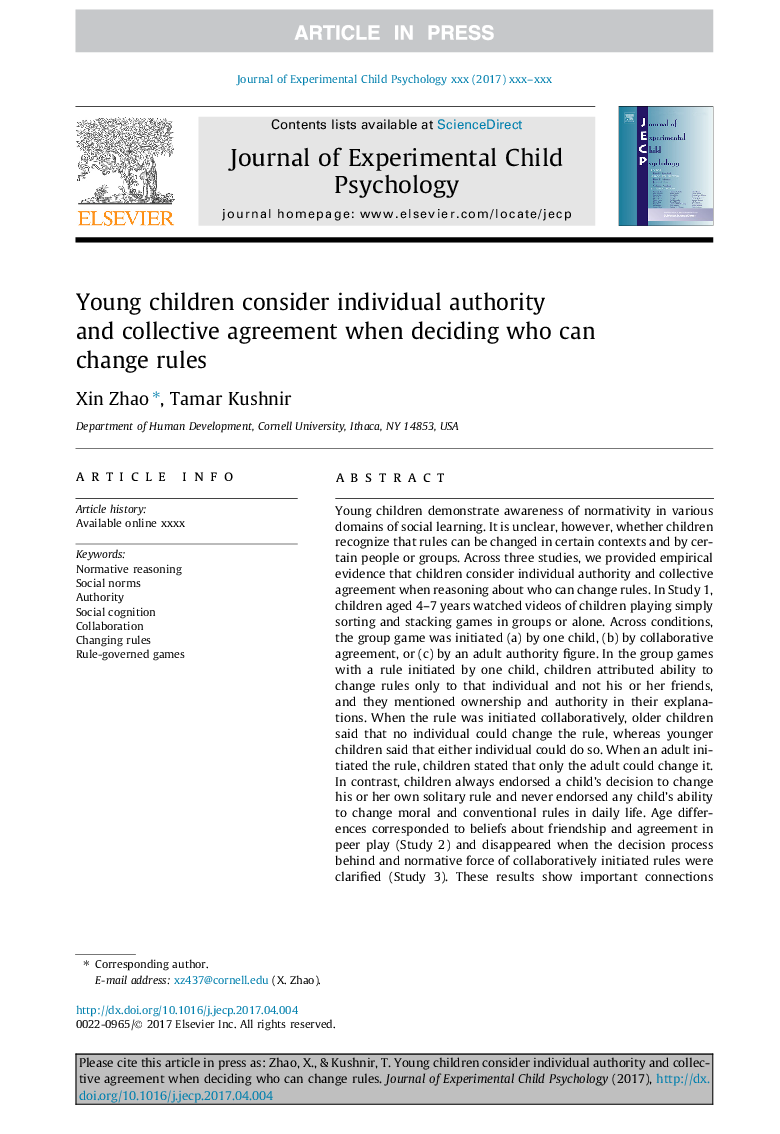| کد مقاله | کد نشریه | سال انتشار | مقاله انگلیسی | نسخه تمام متن |
|---|---|---|---|---|
| 7274342 | 1473447 | 2018 | 16 صفحه PDF | دانلود رایگان |
عنوان انگلیسی مقاله ISI
Young children consider individual authority and collective agreement when deciding who can change rules
ترجمه فارسی عنوان
وقتی کودک تصمیم بگیرد که چه کسی می تواند قوانین را تغییر دهد، کودکان جوان در نظر می گیرند که اختیار فردی و توافق جمعی
دانلود مقاله + سفارش ترجمه
دانلود مقاله ISI انگلیسی
رایگان برای ایرانیان
کلمات کلیدی
استدلال نظری، هنجارهای اجتماعی، قدرت، شناخت اجتماعی، همکاری، تغییر قوانین، بازی های حاکم بر قانون
ترجمه چکیده
کودکان کودک آگاهی از هنجار بودن را در حوزه های مختلف یادگیری اجتماعی نشان می دهند. با این حال مشخص نیست که آیا کودکان می توانند قوانین را در شرایط خاص و بعضی از افراد یا گروه ها تغییر دهند. در سه مطالعه، شواهد تجربی شواهدی ارائه دادیم که کودکان در هنگام استدلال درمورد کسانی که می توانند قوانین را تغییر دهند، در مورد اقتدار فردی و توافق جمعی در نظر می گیرند. در مطالعه 1، کودکان در سن 4 تا 7 سالگی یک سال فیلم های کودکان را تماشا می کردند که به راحتی دسته بندی و جمع بندی بازی ها در گروه ها یا به تنهایی انجام می شد. در هر شرایطی، بازی گروهی توسط یک کودک آغاز شد (الف)، (ب) با توافق مشارکتی، یا (ب) یک شخصیت بالغ بالغ. در بازی های گروهی با یک قانون که توسط یک کودک آغاز می شود، کودکان توانایی تغییر قوانین را فقط به آن فرد و نه دوستان خود اختصاص دادند و در توضیحات خود مالکیت و قدرت را ذکر کردند. هنگامی که این قانون به طور مشترک آغاز شد، کودکان بزرگتر گفتند که هیچ فردی نمی تواند این قانون را تغییر دهد، در حالی که بچه های جوانتر گفتند که هر فرد می تواند این کار را انجام دهد. وقتی یک بالغ قانون را شروع کرد، کودکان اظهار داشتند که تنها بزرگسال می تواند آن را تغییر دهد. در مقابل، کودکان همیشه تصمیم کودک را برای تغییر حکومت انفرادی خود تایید کرده و هرگز توانایی کودک در تغییر قوانین اخلاقی و متعارف در زندگی روزمره را تأیید نکردند. تفاوت سن با باورهای دوستی و توافق در بازی همسالان (مطالعه 2) مطابقت داشت و زمانی که فرایند تصمیم گیری پشت و نیروی هنجاری قوانین همکاری آغاز شد، ناپدید شد (مطالعه 3). این نتایج نشان می دهد که ارتباطات مهم میان هنجار و ملاحظات قدرت و همکاری در اوایل دوران کودکی وجود دارد.
موضوعات مرتبط
علوم انسانی و اجتماعی
روانشناسی
روانشناسی رشد و آموزشی
چکیده انگلیسی
Young children demonstrate awareness of normativity in various domains of social learning. It is unclear, however, whether children recognize that rules can be changed in certain contexts and by certain people or groups. Across three studies, we provided empirical evidence that children consider individual authority and collective agreement when reasoning about who can change rules. In Study 1, children aged 4-7Â years watched videos of children playing simply sorting and stacking games in groups or alone. Across conditions, the group game was initiated (a) by one child, (b) by collaborative agreement, or (c) by an adult authority figure. In the group games with a rule initiated by one child, children attributed ability to change rules only to that individual and not his or her friends, and they mentioned ownership and authority in their explanations. When the rule was initiated collaboratively, older children said that no individual could change the rule, whereas younger children said that either individual could do so. When an adult initiated the rule, children stated that only the adult could change it. In contrast, children always endorsed a child's decision to change his or her own solitary rule and never endorsed any child's ability to change moral and conventional rules in daily life. Age differences corresponded to beliefs about friendship and agreement in peer play (Study 2) and disappeared when the decision process behind and normative force of collaboratively initiated rules were clarified (Study 3). These results show important connections between normativity and considerations of authority and collaboration during early childhood.
ناشر
Database: Elsevier - ScienceDirect (ساینس دایرکت)
Journal: Journal of Experimental Child Psychology - Volume 165, January 2018, Pages 101-116
Journal: Journal of Experimental Child Psychology - Volume 165, January 2018, Pages 101-116
نویسندگان
Xin Zhao, Tamar Kushnir,
